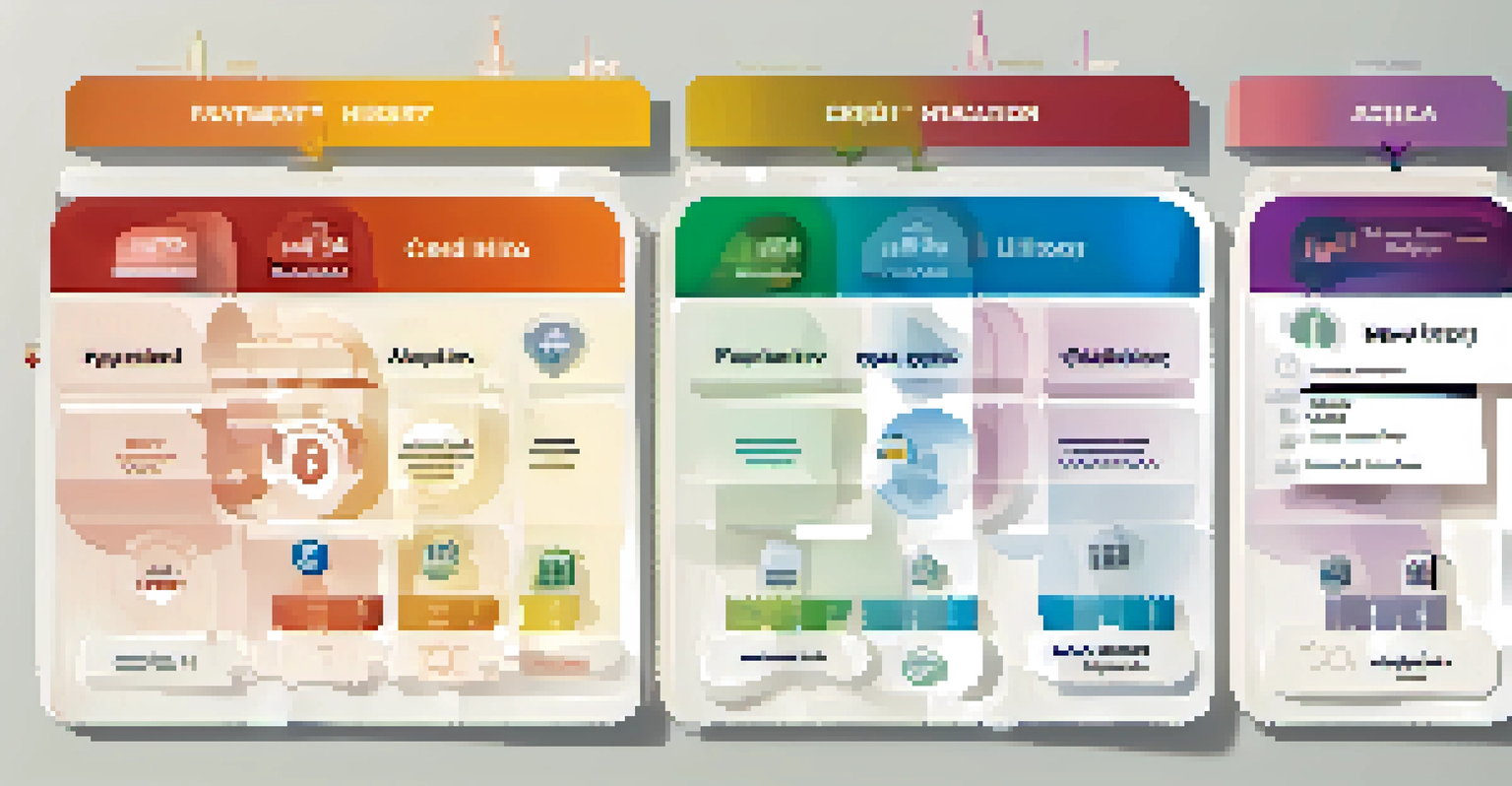Understanding Credit Scores: Improve Your Financial Health

What is a Credit Score and Why Does It Matter?
A credit score is a three-digit number that summarizes your creditworthiness. It helps lenders assess how likely you are to repay borrowed money. Typically, scores range from 300 to 850, with higher numbers indicating better credit health.
A good credit score is a ticket to lower interest rates and better financial opportunities.
Your credit score can significantly impact your financial life. For instance, a higher score can lead to lower interest rates on loans and credit cards, saving you money in the long run. Conversely, a lower score may restrict your options and lead to higher costs.
Understanding your credit score is essential for making informed financial decisions. By knowing what influences your score, you can take steps to improve it and enhance your financial well-being.
The Components of a Credit Score Explained
Credit scores are typically calculated using five key components: payment history, credit utilization, length of credit history, types of credit, and new credit inquiries. Payment history accounts for 35% of your score, emphasizing the importance of paying bills on time.

Credit utilization, which makes up 30% of your score, refers to the amount of credit you're using relative to your total available credit. Keeping this ratio below 30% is often recommended to maintain a healthy score.
Understanding Credit Scores
A credit score is a crucial three-digit number that reflects your creditworthiness and impacts your financial opportunities.
The remaining components look at how long you've had credit accounts, the variety of credit types you have, and any recent inquiries into your credit. Each factor plays a role in painting a complete picture of your financial behavior.
How to Check Your Credit Score and Report
You can check your credit score through various online platforms, many of which offer free services. It’s advisable to review your score regularly to track your progress and spot any discrepancies. Remember, your credit report may differ between agencies, so checking multiple reports can be beneficial.
Your credit score is not just a number; it's a reflection of your financial habits and choices.
AnnualCreditReport.com is a reliable source for obtaining your credit reports from the three major credit bureaus: Experian, Equifax, and TransUnion. You’re entitled to one free report from each bureau every year, which is a great way to stay informed about your credit standing.
After checking your score and report, make sure to understand the details. If you notice any errors, dispute them promptly to ensure your score accurately reflects your financial history.
Common Myths About Credit Scores Debunked
Many people believe that checking your own credit score hurts it, but that's actually not true. When you check your score, it’s classified as a 'soft inquiry,' which doesn’t impact your creditworthiness. On the other hand, when lenders check your score for a loan application, that’s a 'hard inquiry' and may slightly lower your score.
Another myth is that closing old credit accounts will boost your score. In reality, this can lower your score by reducing your credit history length and increasing your overall credit utilization. Keeping older accounts open, even if you don't use them often, can be beneficial.
Improving Your Credit Score
You can enhance your credit score by making timely payments, keeping credit utilization low, and avoiding excessive new credit applications.
Lastly, some think that only borrowing money will affect their score. However, factors like missed payments or high credit card balances play a significant role in determining your score, so it's essential to manage your finances holistically.
Tips to Improve Your Credit Score
Improving your credit score is achievable with a few strategic steps. First, ensure that you pay all your bills on time, as payment history is the most significant factor. Setting up automatic payments or reminders can help you stay on track.
Next, work on reducing your credit utilization ratio. Aim to use less than 30% of your available credit. You can do this by paying down existing debts or requesting a credit limit increase, which can provide you with more available credit to use.
Lastly, avoid applying for too much new credit at once. Each application can result in a hard inquiry, which may temporarily lower your score. Instead, focus on building a solid credit history over time.
The Role of Credit in Major Life Decisions
Your credit score can influence many significant life choices, such as buying a home or securing a car loan. Lenders often use your score to determine the interest rates and loan amounts you're eligible for, which can affect your budget and financial plans.
Additionally, landlords may check your credit as part of their tenant screening process. A higher score can make it easier to rent your desired property, while a lower score might limit your options or require a larger security deposit.
Credit's Impact on Life Choices
Your credit score influences major decisions, including loan approvals, rental applications, and even job opportunities.
Even employment opportunities can be impacted by your credit history, especially for roles that involve financial responsibilities. Being proactive about maintaining a good credit score can open doors and provide greater opportunities in various aspects of your life.
Resources for Ongoing Credit Education
Staying informed about credit and finances is crucial for long-term financial health. Numerous resources are available online, such as blogs, YouTube channels, and podcasts dedicated to personal finance. These platforms can offer insights and tips on managing credit effectively.
Consider joining community workshops or webinars that focus on financial literacy. Many non-profit organizations provide free resources and education to help individuals better understand credit and improve their financial health.

Lastly, don't hesitate to consult with a financial advisor if you have specific questions or need personalized guidance. Investing time in learning about credit can pay off in the form of improved financial decisions and healthier credit scores.